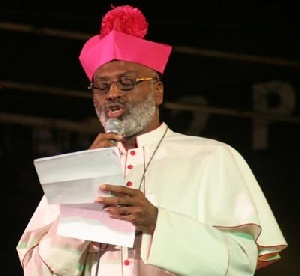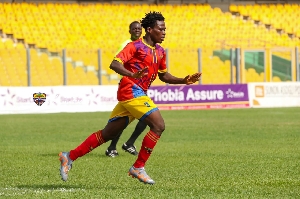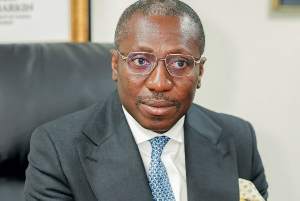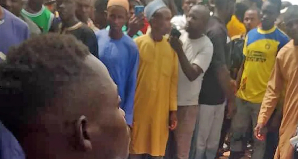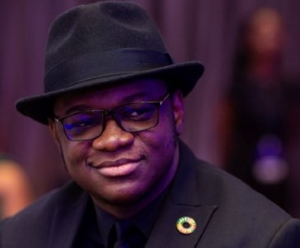The Roman Catholic Archbishop of Accra, Charles Palmer Buckle, says the practice of winner takes all in Ghanaian politics is an impression that has been given credence, but not captured in the constitution, and wonders why ruling governments will not consult the opposition parties for ideas and policies that will move the country forward.
He added that, there is a certain mentality that reinforces this trend. “It is egocentric, which moves on to become clannish, to become tribalism, ethnocentric and becomes partisan politics; the same human attitudes that have been allowed into the microcosm of the society”, he said.
In a conversation with Dr Charles Wereko-Brobby on Tarzan’s Take on Multi TV, the Archbishop reiterated that: “each one of us has something to contribute, therefore, there is the need to at least consult if we don’t want to bring others in”. He cited examples in America where President Obama has appointed and consulted members of the Republican Party on policy issues.
In her opinion, chairperson of the CPP, Samia Nkrumah, who was also on the programme, said the ruling party has the right to appoint and to confer privileges on whomever it intends to, which becomes problematic when certain conditions are missing. “It is not about personalities from a different party joining the ruling party. What we must focus on are issues,” she mentioned.
Samia added that it is feasible for the CPP to accept an invitation to join President Mahama’s administration, but without adopting some of the CPP’s principles, it will be totally useless.
She insisted that ideology does matter, and that one can see that some parties like the NDC and CPP have similar ideologies, but some modules such as trade liberalization and the new liberal modules being practiced in Ghana and other countries in Africa are not helping with development, hence the need for a radical departure.
The CPP Chair made reference to the fact that when the NDC was in power from 1992, they did not resist the excessive dependency or reliance on prescriptions of the International Monetary Fund (IMF) and the World Bank, and thinks “we have not benefited from this dependency, so let us take a closer look, review that and step-by-step, go back to our self-reliance approach”.
The main problem of the country, according to Samia, is the lack of a development plan that successive governments can adopt in different ways to serve the interest and wellbeing of ordinary Ghanaians.
Executive Director of the Institute for Democratic Governance (IDEG), Dr Emmanuel Akwetey, who was also a guest on the programme said the phenomenon of “winner-takes-all” is particularly pervasive within the executive arm of government when it comes to appointments made by the president.
He said: “We have a notion that if you are in the opposition party, you have a philosophy that makes you incompatible with the ruling party, so you must stay out, not only that, you are pursued,” adding that “your businesses could collapse for unseen reasons, and people don’t find jobs”.
He noted: “this practice and design of that framework, does not enable us get the best brains for development”.
The president, according Dr. Akwetey, must have the latitude to choose whoever he believes will help him to deliver the vision for the country based on competence, citing as an example, the appointment of Papa Kwesi Nduom, then of the Convention People’s Party (CPP) and now of the Progressive People’s Party (PPP) as a member of President Kufuor’s cabinet .
He argued that, in terms of ideology, President Kufuor moved NPP, which is principally capitalist to the centre where it became even more socially democratic with the introduction of social intervention programmes such as the National Health Insurance Scheme (NHIS), the School Feeding Programme and many others.
In agreement with Dr Akwetey’s submission, Archbishop Palmer Buckle said “the time has come for us to build consensus,” and that there is hardly a distinction in party ideologies these days. “We pay too much lip service to ideology in Ghana; it is about the common good for the masses,” he emphasised.
Palmer Buckle bemoaned the practice where people get into positions of authority and lose sight of the general and common good of the ordinary Ghanaian whose sovereignty emboldens the national sovereignty.
Dr Akwetey was of the assertion that our democratic culture is extremely weak as our democracy is becoming more consolidated and stronger, claiming that, as a country, we cannot do the things which are directive principles of state policy because we have designed a system that focuses on elections and nothing else.
“We finished election 2012, next year if all goes well, parties will do their internal elections, then the primaries are continued in 2015. In 2016, they don’t take any decision of any meaningful consequence”.
This situation, he said, makes it difficult for political parties to think long term developmental planning. “In Ghana, it is a common thing, you lose power and the opposition party quickly withdraws to go prepare for the next elections,” he concluded.
In her final submission, Samia Nkrumah advocated that different political parties should be mobilized and their policies listened to.
“Let us take the ideas from the parties and listen to what they have to contribute and try implementing them. You don’t need to make people ministers to do that, we would rather you take our policies”, she said.
General News of Monday, 16 September 2013
Source: joyonline

